Matthew Brett has a long history of investing in Japanese companies and has the support of a highly experienced team
Jared Anderson was appointed co-manager earlier this year and together they focus on companies they believe have high-growth potential
Over the long term the fund has performed well against the broader Japanese stock market and peers
This fund features on the Wealth Shortlist of funds chosen by our analysts for their long-term performance potential
How it fits in a portfolio
The Baillie Gifford Japanese fund invests in companies based in Japan. It focuses on larger companies but invests more in medium-sized companies than some other funds in the Japan sector. Investments in smaller businesses adds risk. The fund is managed in line with Baillie Gifford's growth-focused investment philosophy, with a focus on companies with high or sustainable growth potential.
This fund could be used to diversify a global investment portfolio and add long-term growth potential. It could also be used to sit alongside other funds using a value investment style and a focus on companies that have recovery potential.
Manager
Matthew Brett is the fund’s lead manager. He has 22 years’ experience in the investment industry, all of which have been spent at Baillie Gifford. This means he’s well-embedded in the firm’s culture and style of investing.
Brett joined Baillie Gifford’s Japan team in 2003. He became co-manager of the Japanese fund in 2008, alongside Sarah Whitley, another experienced investor in Japan, and later became the fund’s lead manager. He continued to work closely with Whitley until she retired and left Baillie Gifford in 2018 and learned a lot from her knowledge and experience during their time working together.
Brett also manages the Baillie Gifford Japan Trust, which has significant overlap with this fund. He also co-manages the Baille Gifford Income Growth fund with Karen See. This has similarities with the Japanese fund, though it focuses more on providing an income. His primary focus is on the Japanese fund and Japan investment trust though.
Jared Anderson became co-manager in January 2025. He joined Baillie Gifford in 2016 and has previously been a member of its Global Alpha and Japanese Equities teams. This meant he was already familiar with the fund’s investment process. Anderson also co-manages the Baillie Gifford Smaller Companies fund and Shin Nippon Investment Trust. The smaller companies identified for these funds are used as potential future opportunities for the Japanese fund.
We believe Brett and Anderson’s fund management responsibilities are manageable given the overlap in investments and process. Both managers also have the support and work with the wider Japanese team. We like the collaborative approach, with ideas coming from across the team and a focus on developing talent.
Process
The fund’s philosophy is aligned with other Baillie Gifford funds. This means Brett and Anderson focus on the fundamentals of individual companies and their long-term potential for growth. They invest in what they believe to be some of the best companies in Japan with at least a five-year view.
The fund invests in companies at different stages of growth, and is segmented into four buckets:
Secular Growth - companies with high growth potential
Growth Stalwart - steady compounders that may deliver steadier rates of growth
Special Situations - larger conglomerates or businesses trading on a low share price that the managers don’t believe reflects their true worth
Cyclical Growth - companies that could be more sensitive to changes in the health of the economy.
Overall, this makes the managers ‘growth’ investors. But they’re flexible and invest in a range of companies with different drivers of growth, and some that are lowlier valued and may not be typical of a growth investor.
Importantly, each business must demonstrate resilience and have an adaptable or durable enough competitive advantage that could help them deliver growth over the next 5-10 years.
This has led the fund to have a bias towards online and digital businesses, automation-related companies, and companies that could benefit from rising consumption across Asia. On the other hand, they currently tend to avoid industries they believe are in long-term decline, such as autos, ‘old-fashioned’ financial companies and banks, and iron and steel.
Computer gaming is an area that’s recently increased. Global revenue from gaming was $187.7bn in 2024, far surpassing other media forms like music and film. The managers believe Japanese gaming companies with strong heritage and well-known characters, which are conservatively managed could benefit from this appeal and growth over the long term. Sega Sammy and Square Enix were recently added to the fund and sit alongside existing holding Nintendo.
Culture
Baillie Gifford is an independent private partnership founded in 1908. It's owned by partners who work full time at the firm. This ownership structure means senior managers have a vested interest in the company, and its funds, performing well. Brett is a partner in the firm, which means he’s well-incentivised for this fund to perform well, as well as to ensure he makes a valuable contribution to the wider business and its success.
We think this has helped cultivate a culture with a long-term focus, where investors' interests are at the centre of decision making. We also like that fund managers are incentivised in a way that aligns their interests with those of long-term investors and should retain talented managers.
ESG Integration
All of Baillie Gifford’s funds are run with a long-term investment horizon in mind. The firm’s fund managers see themselves as long-term owners of a business, not short-term renters. So, assessing whether society will support, or at the very least, tolerate, the business model over the long term, and whether management will act as good stewards of shareholders’ capital is an important part of the investment process.
Investment teams, including the Japan team, have access to dedicated ESG (Environmental, Social and Governance) specialists, and the firm also has a Climate team and ESG services team which is responsible for voting operations and ESG data. Individual investment teams are responsible for voting and engagement for the companies they invest in. Investment in controversial weapons and companies involved in recreational drugs are prohibited across the firm.
Baillie Gifford courted controversy in 2024 when it left the Net Zero Asset Managers’ Initiative, a group of asset managers that have committed to achieving net zero carbon emissions by 2050, and the Climate Action 100+ collaborative engagement scheme. It claimed membership of the organisations “has become contested”, adding “this risks distracting from our core responsibilities”. This is disappointing but we’re encouraged the net zero and engagement-related commitments remain unchanged.
Within this fund, sustainability and ESG issues form a key part of the manager’s research and analytical framework. We feel ESG is always considered when the team researches all companies, though this is not a specialist responsible or sustainably invested fund.
Cost
This fund is available at an annual ongoing fund charge of 0.63%. This makes it one of the lowest cost active funds in the Japan sector. The HL platform fee of up to 0.45% per year also applies, except in the HL Junior ISA, where no platform fee applies.
Performance
Since Brett has been involved in the fund’s management in 2008, it’s grown 306.99%* compared with 242.35% for the average fund in the IA Japan sector. This is an impressive return, though as always past performance isn’t a guide to future returns.
Given the fund’s growth-focused investment style, it tends to perform better when growthier companies are in favour, but not as well when value-focused companies or those undergoing a recovery are performing well. Over the longer term, our analysis shows the managers have added value through stock picking – this means the ability to invest in companies that go on to perform well, regardless of what sector they’re in, and without making ‘bigger picture’ economic calls.
All funds have tougher periods as well though, and this one didn’t perform as well as the broader market or average fund in the sector from 2021-23. This was partly due to the manager’s growth investment style being out of favour. Over this time, value-focused funds performed much better in Japan. The manager also made some stock picking mistakes.
More recently over the past 12 months the fund’s grown 21.71%, an extremely attractive return for investors. This is behind the 24.92% achieved by the average Japan fund though, as once again value investing was favoured over this time. Medium-sized companies also haven’t performed as well as larger ones.
An investment in internet services company Softbank was the strongest performer over the year, due to rising investor interest in its links to AI (artificial intelligence). Financial company SBI Holdings and Nintendo were also among the strongest performers.
Unicharm, which makes baby and feminine hygiene products, detracted from performance over the year. Some companies not related to areas like AI have tended to struggle this year, but the managers believe Unicharm will do well over the long term, given the need for products such as nappies and hygiene care is unlikely to disappear. They recently bought more shares to benefit from a more attractive share price.
Over the longer term we expect the managers to deliver performance from good stock picking, and when growth investing is in favour, though there are no guarantees.
Annual percentage growth
31/10/2020 To 31/10/2021 | 31/10/2021 To 31/10/2022 | 31/10/2022 To 31/10/2023 | 31/10/2023 To 31/10/2024 | 31/10/2024 To 31/10/2025 | |
|---|---|---|---|---|---|
Baillie Gifford Japanese | 11.57 | -18.67 | -1.00 | 11.81 | 21.71 |
IA Japan | 14.12 | -11.95 | 10.45 | 13.96 | 24.92 |


